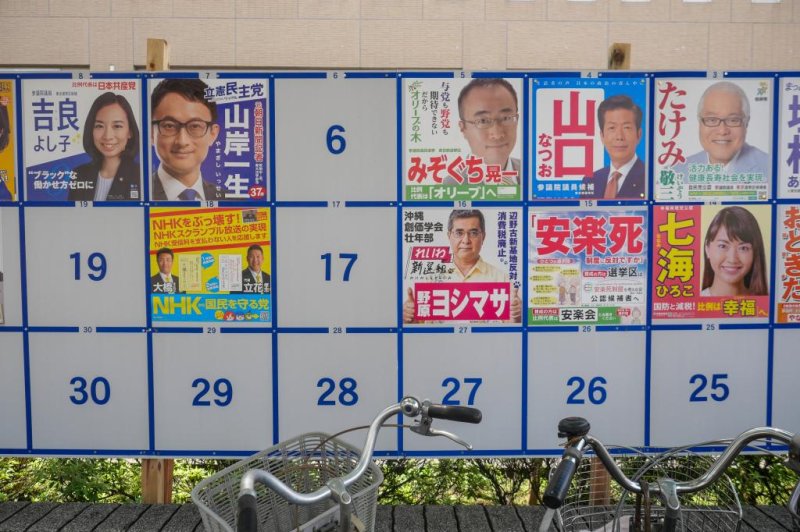1 of 3 | A bulletin board in Tokyo shows candidates for Japan's parliamentary elections held on Sunday. The ruling Liberal Democratic Majority maintained its majority in the upper house of the Diet according to exit polls. Photo by Thomas Maresca/UPI
TOKYO, July 21 (UPI) -- Prime Minister Shinzo Abe's ruling coalition is projected to maintain its majority in Japan's upper house of parliament, according to exit polls shortly after voting closed Sunday evening.
Abe's Liberal Democratic Party and its coalition partner Komeito are expected to win at least 63 of the 124 seats that were being contested in the House of Councillors, according to the exit polls from Kyodo News Agency.
Sunday's election was marked by low voter turnout and a malaise that has long characterized Japanese politics. As of 6 p.m. local time, two hours ahead of polls closing, turnout was 27.3 percent, 5.19 percentage points lower than elections three years ago, according to Japan's Ministry of Information and Communications.
It remains uncertain whether the ruling bloc will hold onto its two-thirds supermajority in the upper house, which is a prerequisite for one of Abe's chief policy goals: amending Japan's constitution to allow its military, known as the Japan Self-Defense Forces, to take on a more active role.
In order to have enough votes to hold a public referendum on the constitutional change, Abe's ruling coalition and other pro-revision parties would need to win 85 seats. Final results are expected early on Monday local time.
Abe has long advocated for revising Japan's pacifist constitution, which was written by the United States after World War II, to allow for a more robust military.
Japan is heavily restricted by the constitution's Article 9, which states that "the Japanese people forever renounce war as a sovereign right of the nation and the threat or use of force as means of settling international disputes."
The article also says that "land, sea and air forces, as well as other war potential, will never be maintained."
However, Japan has operated its Self-Defense Forces for more than 60 years, with some 250,000 well trained and equipped air, naval and ground troops. They have been able to take part in limited peacekeeping operations but are heavily restricted in engaging in combat operations.
Against an increasing nuclear threat from North Korea and an increasingly assertive China, Abe has already been able to expand Japan's military capacity and pass a law that allows Japan to defend its allies. He has set 2020 as the target date for amending the constitution.
The Japanese public remains divided about the constitutional revision. In a July 13-15 poll from national broadcaster NHK, 29 percent of respondents said the constitution needed to be amended, 32 percent said it was not necessary to amend it, and 30 percent were undecided.
The issue hasn't played a large role in this election for voters. According to the same poll, only 8 percent of respondents named constitutional reform as a top priority. Economic issues, such as plans for Japan's social security system and a consumption tax hike that Abe has announced for October, were the primary issues that voters named.
Sunday's results leave Abe on course to become the longest-serving Japanese prime minister, a role he has held continuously since 2012. He was also prime minister from 2006 to 2007.















